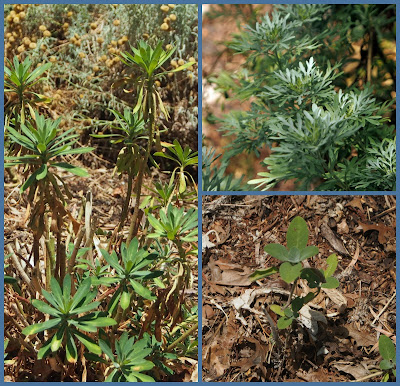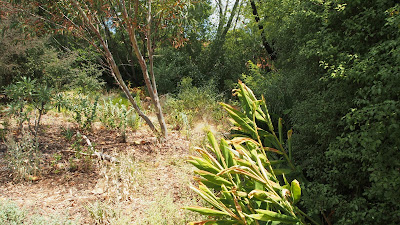testing times
I like the look of a dry garden because it looks natural in a harsh climate. This December has had record-breaking high temperatures, and we are told this is the new normal, not a freakish early summer.
In nurseries, plants now are generally classified as one drip for drought resistance, two drips for needs seasonal watering and three drips for thirsty plants. What this doesn't take into account is position, position, position.
It's not only thirst that does 'em in, I've noticed. Sometimes I say the most important part of a plant is underground, what you don't see. This is to remind people that plants have roots. But of course leaves are equally important. If a plant is unshaded, and doesn't have the capacity to soak up the strong sunshine, its leaves will shrivel and it will die no matter how much water you give it.
 |
| Tough grasses dotted irregularly along the path |
So what does gardening in this heat mean for me? It means looking and observing with minimum compassion and maximum ruthlessness. I selected a small number of plants to water because it is their first summer and I think they are tough enough and in the right position to survive in time. The rest, I just watch. Lots are happy and doing well, but quite a few just give up and become shrivelled and dried out.
 |
| Gaps in the garden |
 |
| Wattleseeds |
The gaps they leave become opportunities for me to replace them with tougher and more suitable plants. They also give a different perspective on the design of the garden. For example, I had a drift of Euphorbia martinii in the front. One of the five plants was larger than the others. It is the only one that has survived. Come autumn, I won't just recreate the drift with different plants. I'll change the planting pattern as well as the plants.
 |
| Unknown Clematis species with small fluffy flowers |
... and when it's just too hot to go out into the garden I read nursery catalogues or browse the shelves of Bunnings and Masters for ideas.
 |
| Yellow flowers of Bronze Fennel light up the garden between Leptospermum brevipes and Snow Gum (Eucalyptus pauciflora) |
I'm linking this post to Helen Johnstone's End of Month View meme in her blog The Patient Gardener. This meme has been going for 6 years now, and is a great opportunity to share the progress of your garden with others all around the world.
 |
| Banksia marginata and Derwentia perfoliata - hot weather heroes |
As I write this it is raining - really hard. When it stops it will be exciting to see what has recovered - and what hasn't. Not that that's the end of it. We're only a third of the way into summer and it's going to be a long hot summer. The rain is just providing temporary relief. I'm not complaining though - that's the nature of gardening in Melbourne at this time of climate change. Other people in other places in Australia are doing it really tough - battling floods and bushfires.
 |
| Some of the summer heroes: Plumbago, Euphorbia rigida, Dianella caerulea, Lambs Ears, Garlic Chives, Echium candicans, Lavatera, Dietes bicolor, Dodonaea viscosa (Hop Bush) |
 |
| More summer heroes: Euphorbia martinii, Canary Island Wormwood, Broad Leaved Sage (Salvia berggarten) |




I'm glad I kept looking and have found a place to comment. I enjoy reading your posts especially because you seem to be gardening in a similar environment to me. Certainly very tough at the moment. One of the biggest problems for me are Gum Tree roots, they find their way to any water source. I resorted to pots in many places then discovered the roots could make their way through double thickness weedmat and up through the drainage holes!
ReplyDeleteHi Sue, lovely to hear from another Aussie. Those gum tree roots sound like a real problem. I think the 'solution' (easier said than done) is to find really tough plants that won't need much water once established. Then the whole area can be dry. Do you know Diggers Club? They specialize in good plants for dry gardens. I think we have to ditch our fantasies of lush cottage gardens and make garden pictures that look like the Australian bush. Even if the plants we use aren't natives.
DeleteHappy New Year Sue. Hopefully most of your plants will survive the drought. I don't see the gaps in your garden, only the beautiful hybrid path.
ReplyDeletethanks for this, Denise, and Happy new year to you too. I'm thinking the spaces between plants can be seen as gaps, or simply as spaces. The difference means being satisfied and accepting it as it is - or not.
DeleteI battled to keep lamb's ears alive in Porterville's hot summer. Here on False Bay I am watching ... as it flourishes without being watered.
ReplyDeleteI've been yanking out volunteer seedlings and moving them around, and amazed how they mostly survive.
Happy New Year and kind weather I wish!
I've been trying to control myself and not move anything till after summer but it's very hard. Lambs ears are supposed to really tough. So far mine are surviving. I guess the soil was very different in Porterville compared to FB.
DeleteI'm lucky in that we have significantly more rainfall than you do and I can water when it gets dry, although I try to use plants that will thrive in their spots without too much extra water. Hopefully, there will be more rain coming to all of Australia. :o) Happy New Year! May it be moist and mild.
ReplyDeleteHi Tammy, happy new year to you, and thanks for your kind wishes. We are still allowed to water, it's just my stubbornness that makes me try to go without watering. I have heard it said Australia is the driest continent.
DeleteI know that feeling of disappointment when going outside after a long hot couple of days to see plants dry and shrivelled. You're right though, it's a good opportunity to replace them with tougher and more drought-tolerant plants.
ReplyDeleteHi Amy, it's like looking at the glass half full or half empty. You can focus on the shrivel or the survivors. At the moment in Melbourne we're having a mild break. Temperatures only in the mid 20s but still no rain. Apparently more very hot weather ahead.
DeleteSummer is always harder on plants here than winter. A hardy plant will easily come through winter, only to die under intense summer sun, heat and humidity. We do get lots more rain than you, but we also have occasional drought. I have always said the main criteria for choosing a plant for my garden is its ability to survive. Like you, I have become more ruthless as the years pass. If a plant dies, I try to find another that is more suitable. Best wishes for a very happy and successful gardening year!
ReplyDeletethanks, Deb, and happy new gardening year to you too. It's wonderful sharing our ruthlessness(es?)
DeleteThat is tough without the rainfall...glad you have some. I think tough conditions certainly make us patient and discerning gardeners. Here with our winters (or when we had harsh winters the last 2 yrs) I can see many plants never come back or flower. Wishing you a wonderful New Year Sue!
ReplyDeletethanks, Donna, happy new year to you too. I am actually enjoying the garden, even to some people it looks awful and dessicated. I'm thinking we are trying to work with the environment, whereas some people try to fight it.
Delete
ReplyDeleteVery thoughtful advice from such a good gardener. I love it! Especially 'minimum compassion and maximum ruthlessness'. It seems the high heat and less rain is becoming the norm and any gardener who does not adjust will have wilted and dead plants quite often. I'm so sorry it is so hot and dry already for you but happy it has rained. Have a great new year!
thanks, Tina, it's great to catch up again.
DeleteI like how you work with what nature gives you Sue. Absolute opposite conditions here in Cheshire, drip, drip, drip. Mind you a little further North from us and the poor people have been suffering from terrible flooding. Have a really good year ahead.
ReplyDeleteHere we're lucky if we don't have bushfires or floods - like you, we don't have the worst of it. Happy new year to you too, Alastair.
DeleteHi Sue,
ReplyDeleteHappy New Year! Haven't commented in ages, but when time permits always check your posts. Sydney West was parched until the rain a few days back! Lawn gone (never liked or planted it anyway) garden survived :) like yours with virtually no watering - all Aussies. Time to plan a lawnless front yard and you keep inspiring me :D
Maree
lovely to hear from you Maree, happy new year, good luck for achieving a lawnless front yard.
Delete